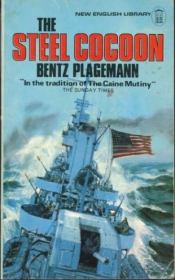Bentz Plagemann - The Steel Cocoon
 | Название: | The Steel Cocoon |
Автор: | Bentz Plagemann | |
Жанр: | Морские приключения, Военная проза | |
Изадано в серии: | неизвестно | |
Издательство: | неизвестно | |
Год издания: | 1957 | |
ISBN: | неизвестно | |
Отзывы: | Комментировать | |
Рейтинг: | ||
Поделись книгой с друзьями! Помощь сайту: донат на оплату сервера | ||
Краткое содержание книги "The Steel Cocoon"
Life aboard the WW II destroyer AJAX whose routine is flawed by an officer-enlisted man gulf, autocratic actions, fatal accidents, and men going "Asiatic," even psychotic.
THE sick bay of the destroyer Ajax on her shakedown cruise, the war seemed remote to Tyler Williams. A civilian in the uniform of a pharmacist's mate, Williams was a member of the crew; yet by the special nature of his duties he was a man apart. To whom then did he belong? To his superior, that strange and perhaps dangerous man, Chief Bullitt? To himself? To the men of the crew, so vulnerably dependent upon one another? By the time the shakedown was over and the Ajax was ready for war, Tyler Williams would find his answer.
This is a story of the rigorous training, raucous shore leaves and dramatic emergencies that mold men into a fighting crew. With humor, zest and compassion, The Steel Cocoon looks deep into the special world that is life on a Navy ship.
Читаем онлайн "The Steel Cocoon". [Страница - 2]
- 1
- 2
- 3
- 4
- . . .
- последняя (32) »
Williams had first met Chief Bullitt on the dock at Norfolk, where the chief sat on a packing case filled with bottles of blood plasma, smoking a cigarette. There was something about the chief which suggested the nervelessness of some large, articulated insect, a praving mantis, perhaps, in Navy khaki. Physically he was slender, browned, ageless. He held himself with an elegant, angular erectness, and his attitude showed that he knew himself to be superior. When Williams presented himself as his new assistant on the Ajax, Chief Bullitt acknowledged him with a look of insolent contempt, one knee crossed over the other, his cigarette held at a right angle to his thin, tanned hand. "And what are your qualifications for the Hospital Corps?" he asked. "A job in a Liggett's drugstore?"
"No," Williams said. "I was an English instructor."
"Mercy," Bullitt said. He shook his head as if he had been beset by flies. "I thought I had seen everything. Well," he went on, with an air of resignation, "we may not be able to set broken bones together, but at least we can always split an infinitive."
Williams said nothing.
"I suppose you have a wife somewhere," Bullitt said, drawing at his cigarette, "and one and a half children."
"No," Williams said, stifling his anger, "I am not married,"
"Well," Bullitt said, "at least I will be spared the boring details of your domestic life."
Williams reminded himself that presumably there was nothing personal in this attitude of contempt. He had encountered it before. It was the instinctive withdrawal, he told himself, of the career military man who finds the enforced company of civilians tiresome, with their untidy thoughts, and their undisciplined attachment to families ashore, Williams had yet to learn of the larger area of Chief Bullitt's contempt. Nineteen years in the enlisted ranks of the Navy, the absence of the mature responsibilities of family life, the endless, intimate association with men lesser than himself, in a daily life where no major decisions were required of him, had given him a contempt which embraced nearly all men. The fastidious withdrawal, the almost fierce detachment which Williams found in him was there not only for Williams, but for all the world as well.
But Tyler Williams had cultivated his own brand of detachment. He had come to the dock at Norfolk from long months of service in a wartime Naval hospital. He had seen too much of suffering and death; the long wards filled with casualties from battles oil North Africa, the amputees, the maimed, the halt, the blind. He had heard too often the cries in the dark of hospital nights; and, in defense, he had girded himself with what he thought was a sublime indifference to the sufferings and the problems of others, in order that he might not be destroyed.
And with an indifference even to their crotchets, he told himself, looking at the set, proud, ugly face of Alexander Bullitt; for with his distinction he was yet one of the ugliest men Tyler Williams had ever seen, with a great beak of a nose, a wide, thin, arbitrary mouth, and deep-set, exhausted eyes. It is possible at that moment, in their mutual withdrawal, that they underestimated each other. Here was a military man, Williams thought, a man limited by the circumstances of his experience, yet with pride arising from that experience: pride both in Navy tradition and in the military tradition of excess. From the look of him it was obvious that he must have spent a good part of his Navy years in the bars of Hong Kong, Pearl Harbor and Norfolk; and an almost equal part of that time tapering off with medical alcohol in the sick bay. Yet he would be pitiless with himself, as well as with others. A Navy man had to be able to drink and roust about all night, if he liked, and yet stand muster, with merciless self-discipline, in the morning.
But Williams would, in this troubled year of 1942, with half the world in flames, accept Bullitt on his own terms. He had no choice.
In the mornings, on the Ajax, Chief Bullitt would take his place silently, with a certain implicit arrogance, in the one chair in the sick bay, a light chair of aluminum, upholstered in noncombustible plastic. He did not rise when Doctor Claremont appeared, but if Doctor Claremont spoke to him first he would, without rising, remove his chief's cap with a sweeping gesture, bow his head and say, "Good morning. Doctor,'" his tone laced with a subtle mockery. Doctor Claremont, with his young, tired, unhappy face, stood through sick call, leaning backward, diffident, with the hesitation of an intern just turned doctor. Doctor Claremont looked at the area of a patient's complaint; Chief Bullitt looked at the patient's eyes. And because Claremont had not challenged Bullitt on that first day, when Bullitt failed to rise and offer him the chair, and did not now know how to rebuke him for the mockery of his address, the order of precedence in the sick bay had been irrevocably established. It was Bullitt who filled the small room with authority, as if even the possession of a medical degree were secondary here, in the closed, private world of the Navy.
When everything was ready, the upper half of the sick-bay door was opened into the midship passageway. On the lower half of the door was a shelf which could be raised, and on which a man might lean his elbows while he waited. If a closer scrutiny was necessary, the lower half of the door was opened and the man came inside, to stand uncomfortably in the small, cleared space between the three men, regarded with skepticism by Chief Bullitt, with scientific detachment by Claremont, with curiosity and ignorance by Williams.
"My back aches, Doc. Down here somewhere. I musta pulled it on a ladder."
"Mister Claremont," Chief Bullitt said, removing the gold toothpick, and uncrossing and crossing his legs, "is a doctor and a gentleman. No familiarity is permitted from a slob like you."
"Yes, sir. Yes, Doctor."
The lower door was opened. The unhappy, nervous boy came in. He pulled out his shirt as instructed and turned, feeling on his back the thin, cool, tactile fingers of Doctor Claremont, the cynical eyes of Chief Bullitt.
D.U. (Diagnosis undetermined.) Discomfort in lumbar area.
Medication: aspirin.
"Next!" Chief Bullitt would call.
"I haven't gone in three days, Doctor."
"Remove your hat, boy," Chief Bullitt said. "And stand at attention when you speak."
The man entered, nervously, and was examined, his shirt pulled out, his abdomen cautiously explored by the fingers of Doctor Claremont. "Any pain here? . . . Here? . . . Here?"
Diagnosis: constipation.
Medication: one ounce of mineral oil with 5 cc. of cascara.
When it was apparent that nothing serious would be reported. Doctor Claremont would leave, with relief, to be called when needed.
It was not often that the crew complained of anything more serious than backache or constipation or athlete's foot. There were mornings when the whole sick bay was crowded with lonely boys from the prairies, all with athlete's foot, sitting around on overturned pails with their feet soaking in other pails of potassium-permanganate solution, and with thermometers in their mouths. "Keeps the yardbirds quiet," Bullitt would say.
The men had learned not to complain of anything serious. If they came in speaking of fever, or dizziness, or any other than generalized discomfort, Chief Bullitt, in Doctor Claremont's absence, would spring into action. "How awful!" he would say. "Mercy, lie down on the deck! How did you make it this far? Oh, my, what a hero!"
The muffled, involuntary hysteria this set off among the thermometers --">- 1
- 2
- 3
- 4
- . . .
- последняя (32) »
Книги схожие с «The Steel Cocoon» по жанру, серии, автору или названию:
 |
| Григорий Андреевич Карев - Синее безмолвие Жанр: Морские приключения Год издания: 1968 |
 |
| Алексей Алексеевич Кирносов - Простое море Жанр: Морские приключения Год издания: 1961 |




